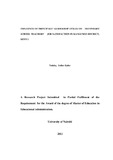| dc.description.abstract | The purpose of this study was to investigate the influence of public secondary school
principals’ leadership styles on teachers’ levels of job satisfaction in Kangundo
District. The objectives of the study were; to establish the extent to which principals
autocratic leadership style influences secondary school teachers’ levels of job
satisfaction, to establish whether principals’ democratic leadership style influences
secondary school teachers’ levels of job satisfaction, to determine the extent to which
principals laissez-faire leadership style influences secondary school teachers’ levels of
job satisfaction and to establish whether principals transformational leadership style
influences secondary school teachers’ levels of job satisfaction.
The study employed a descriptive survey design. The design was convenient as it
ensured that the data obtained gave answers to the research design. The study
targeted principals and teachers in public secondary schools in Kangundo district.
The study used stratified random sampling. This ensured that there was no bias among
the respondents as they had equal chances of being selected to participate in the study.
This improved the representativeness of the sample by reducing the sampling error.
Due to limited resources, time and money, it was not possible to collect data from the
27 principals and 236 teachers that had been targeted for the study. A convenient and
manageable sample size of 20 principals and 160 teachers was identified for the study.
The sample size took into consideration the study’s sampling design. However, those
who responded were 16 principals and 148 teachers.
Data for the study was collected by use of questionnaires and was analyzed according
to descriptive information following the research questions. A pilot study was
conducted to pre-test the reliability and validity of the instrument. Descriptive
statistical analysis was employed which enabled the researcher to reduce, summarize,
organize, evaluate and interpret the numeric information. The findings of the study
were presented using tables, frequencies and percentages because they were easy to
use and analyze.
The researcher personally administered the questionnaires after booking appointment
with the sampled heads of schools. The researcher also sought the help of a research
assistant to administer and collect the questionnaires from different schools. The study
concluded that principals should not depend on only one leadership style in their
institutions but rather use a blend of the different leadership styles for better outcomes
in their schools. | en |

